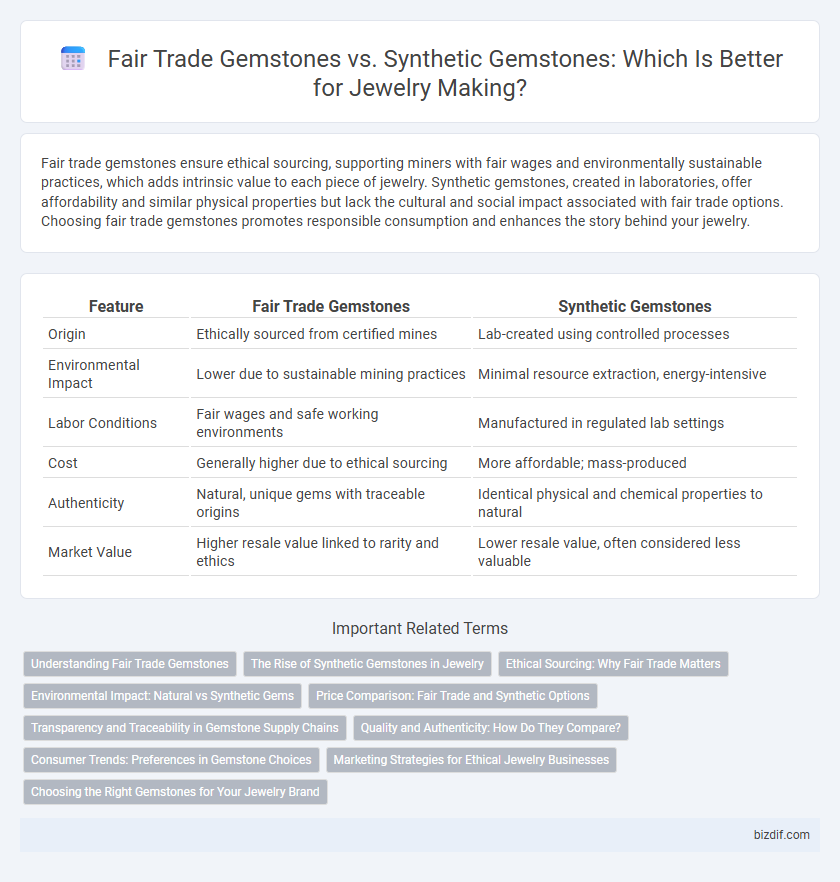Fair trade gemstones ensure ethical sourcing, supporting miners with fair wages and environmentally sustainable practices, which adds intrinsic value to each piece of jewelry. Synthetic gemstones, created in laboratories, offer affordability and similar physical properties but lack the cultural and social impact associated with fair trade options. Choosing fair trade gemstones promotes responsible consumption and enhances the story behind your jewelry.
Table of Comparison
| Feature | Fair Trade Gemstones | Synthetic Gemstones |
|---|---|---|
| Origin | Ethically sourced from certified mines | Lab-created using controlled processes |
| Environmental Impact | Lower due to sustainable mining practices | Minimal resource extraction, energy-intensive |
| Labor Conditions | Fair wages and safe working environments | Manufactured in regulated lab settings |
| Cost | Generally higher due to ethical sourcing | More affordable; mass-produced |
| Authenticity | Natural, unique gems with traceable origins | Identical physical and chemical properties to natural |
| Market Value | Higher resale value linked to rarity and ethics | Lower resale value, often considered less valuable |
Understanding Fair Trade Gemstones
Fair Trade gemstones are ethically sourced from mines that ensure fair wages, safe working conditions, and environmentally responsible practices, supporting local communities and reducing exploitation. These gemstones often come with certification verifying their origin and compliance with fair trade standards, providing transparency and trust to consumers. Emphasizing Fair Trade gemstones in jewelry making promotes sustainable sourcing and social responsibility within the industry.
The Rise of Synthetic Gemstones in Jewelry
Synthetic gemstones have gained significant traction in jewelry making due to their ethical sourcing and cost-efficiency, offering a sustainable alternative to traditional fair trade gemstones. Advances in laboratory technology enable the creation of high-quality synthetic gems, such as lab-grown diamonds and cubic zirconia, which match the physical and optical properties of natural stones. This rise reflects increasing consumer demand for traceability and environmental responsibility in the jewelry industry.
Ethical Sourcing: Why Fair Trade Matters
Fair Trade gemstones ensure ethical sourcing by supporting artisanal miners who receive fair wages and work in safe conditions, reducing exploitation and environmental harm. Unlike synthetic gemstones, which are lab-created and may lack the transparency of mining practices, Fair Trade stones promote social justice and sustainable mining communities. Choosing Fair Trade gemstones contributes to responsible supply chains and supports transparent, environmentally-conscious jewelry making.
Environmental Impact: Natural vs Synthetic Gems
Fair trade gemstones are mined with strict environmental regulations that minimize habitat destruction and water pollution, promoting sustainable practices within local communities. Synthetic gemstones, created in controlled lab environments, significantly reduce the ecological footprint by avoiding mining-related land degradation and reducing carbon emissions. Choosing between fair trade and synthetic gems involves balancing ethical sourcing with environmental preservation, as both options aim to lower the jewelry industry's impact on natural ecosystems.
Price Comparison: Fair Trade and Synthetic Options
Fair trade gemstones often command higher prices due to ethical sourcing, labor standards, and environmental considerations, typically ranging from 20% to 50% more than conventional stones. Synthetic gemstones cost significantly less, sometimes up to 70% cheaper, because they are lab-created, bypassing mining expenses and supply chain complexities. Consumers seeking budget-friendly options lean towards synthetics, while those prioritizing ethical impact invest in fair trade stones despite the premium.
Transparency and Traceability in Gemstone Supply Chains
Fair Trade gemstones ensure transparency and traceability by certifying ethical sourcing practices, directly benefitting mining communities and reducing environmental impact. In contrast, synthetic gemstones offer full traceability through controlled laboratory production but lack the social and ecological benefits associated with Fair Trade standards. Consumers seeking responsible jewelry options prioritize Fair Trade gemstones for their verified supply chains and ethical accountability.
Quality and Authenticity: How Do They Compare?
Fair Trade gemstones are valued for their ethical sourcing and natural authenticity, often exhibiting unique inclusions and color variations that signify genuine formation over millions of years. Synthetic gemstones, created in controlled laboratory environments, offer consistent quality and clarity with fewer imperfections but may lack the distinct character and provenance of natural stones. Jewelry makers prioritize Fair Trade gemstones when emphasizing authenticity and ethical standards, while synthetic options appeal for affordability and flawless appearance.
Consumer Trends: Preferences in Gemstone Choices
Consumers increasingly favor Fair Trade gemstones for their ethical sourcing and environmental sustainability, aligning with growing demand for responsible jewelry. Synthetic gemstones attract buyers seeking affordability and consistent quality without compromising on visual appeal. Market analysis reveals a rising trend towards transparency and traceability, influencing purchasing decisions and brand loyalty in the gemstone industry.
Marketing Strategies for Ethical Jewelry Businesses
Ethical jewelry businesses leverage Fair Trade gemstones by highlighting transparency in sourcing and social impact, appealing to conscientious consumers seeking authenticity. Marketing strategies emphasize Fair Trade certifications and the support of mining communities to differentiate from synthetic gemstones, which are promoted for affordability and environmental benefits. Balancing narratives around sustainability, origin, and quality, these businesses tailor campaigns to diverse buyer values within the ethical luxury market.
Choosing the Right Gemstones for Your Jewelry Brand
Choosing the right gemstones for your jewelry brand involves weighing the ethical appeal of Fair Trade gemstones against the cost-effectiveness of synthetic gemstones. Fair Trade gemstones ensure responsible sourcing, supporting miners' communities while enhancing brand integrity and consumer trust. Synthetic gemstones offer consistent quality and lower prices, appealing to budget-conscious buyers without compromising aesthetic appeal.
Fair Trade Gemstones vs Synthetic Gemstones Infographic

 bizdif.com
bizdif.com